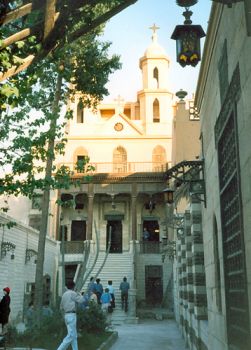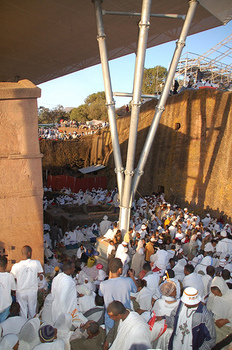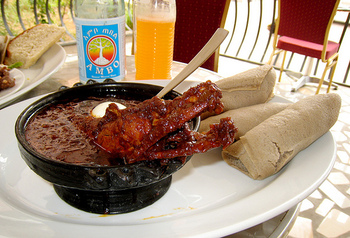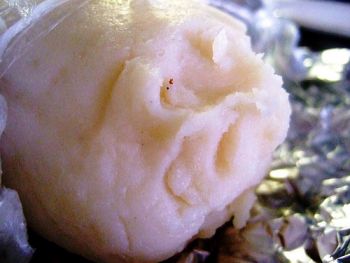Christmas in Africa
Christianity appeared in Africa in the 1st Century AD. Nowadays there are about 350 million Christians living in Africa. Christmas in Africa managed to keep lot of its spiritual meaning. It is far less commercialized than in other parts of the World.
 Saint Mark's cathedral in Cairo, Egypt
Saint Mark's cathedral in Cairo, Egypt
Egyptian Orthodox Christians or Coptic Christians celebrate Christmas on the 7th January. According to their calendar it is the 29th day of the Coptic month of "Kiohk"or "Khiahk". They fast 43 days before Christmas. This is called "Lent fasting". During this period they do not eat meat, fish, eggs and milk. At Christmas Eve there is a special midnight church service. After the service church bells ring. The most famous Coptic church service is held by the Coptic Pope in Saint Mark's cathedral in the Abbassia district of Cairo.
During Christmas church service special bread called "Qurban" is given to people. The bread is also available outside church after the service. In the centre of Qurban there is a cross which is surrounded with twelve dots. These dots represent twelve apostles. After church service people return home and have a special meal called "fatta". The meal usually includes some meat and rice. On Christmas day families visit their friends and neighbours. Children get small amount of money called "El 'aidia". They use the money to buy sweets and toys.
Most Christians in Ethiopia belong to the Ethiopian Orthodox Church. The same as Coptic Christians they celebrate Christmas on the 7th January. They call it "Ganna". It is tradition to fast on Christmas Eve. At dawn of Ganna people traditionally wear white cotton clothes called "shamma". There are some colourful stripes at its ends. Shamma is similar to a Roman style toga. Shamma is not obligatory in big towns or cities. Most people there wear western style clothes.
 Ganna pilgrimage
Bet Maryam, Lalibela
Ganna pilgrimage
Bet Maryam, Lalibela
Lalibela is a famous Ethiopian pilgrimage town located in the north of the country. Each Ganna thousands of pilgrims arrive at the local Bet Maryam (Church of the Virgin Mary).
 Doro wot with injera
Doro wot with injera
The most important dish eaten at Christmas meal in Ethiopia is a stew called "wot". This spicy stew is made of meat and vegetables. Some people also add eggs. Traditional Ethiopian flat bread called "injera" is used as sort of spoon. People tear up piece of injera and use it to scoop up mouthful.
On the 19th January Ethiopians celebrate a holiday called "Timkat." Timkat lasts for three days. On Timkat people celebrate the baptism of Jesus Christ. Special procession is organized. Children wear crowns and clothes of local church youth group. Adults wear the above mentioned shamma. Priests are dressed in read and white clothes. They also carry colourful umbrellas. Traditional music is performed. There is also a traditional game called "yeferas guks". It is played by a group of male riders throwing wooden or bamboo lances at each other. There is no exchange of presents during Ganna and Timkat. Children sometimes get money for new clothes from their family members.
In Malawi children go from house singing Christmas songs and dancing. Especially for the occasion they wear simple clothes made of leaves. In Zimbabwe there is a tradition where children bring little presents to children who are in hospitals or for any reason can not come to church. On Christmas Day several families in the neighbourhood often party together. Adults have a party in one house and children enjoy themselves in another one.
Christmas in South Africa is celebrated in summer. Typical Christmas meal there includes turkey, suckling pig, mince pies, yellow rice etc. People enjoy delicacies like Christmas Pudding and Lekker Pudding. Christmas Carols singing on Christmas Eve is very popular in towns and cities.
In Madagascar Christmas is the time of mass baptism of children. There is also a tradition of visiting elders and other highly respected people in certain community.
In Democratic Republic of Congo people gather in churches on Christmas Eve. Church choirs sing Christmas carols. Religious plays are performed. These plays begin with the creation and the Garden of Eden and end with the story of King Herod killing the baby boys. So, it is understandable that everything lasts for a long time.
In Ghana singing of church choirs, lot of dancing and a Nativity play are essential parts of church services on Christmas Eve. After church service on Christmas morning everybody hurries home to exchange presents. During Christmas meal people in Ghana eat stew or okra (gumbo) soup, porridge and yam paste called "fufu". Some people in Ghana also go to church on the 31st December to thank God for sending Jesus Christ.
 Fufu
Fufu
One of the most popular Christmas traditions in Nigeria is decorating of homes and churches with palm fronds. According to an old belief palm fronds symbolize peace, so people think that they are going to bring peace and harmony in their life during Christmas season. Apart from Christmas carols and midnight mass people in Nigeria have the traditional "Ekon" play. Group performing this play dances from home to home carrying a "baby." The baby symbolizes the birth of Jesus Christ. Home owner accepts the doll and give some presents to members of the group. Then the doll is returned to group who continues their "journey".
For Nigerian Christians Christmas would not be complete without a Christmas cake. Other dishes present as part of traditional Nigerian Christmas meal are meat (turkey, goat, ram, chicken), some sort of stew, pounded yam, jollof rice, fried rice etc. In Gambia there is a special Christmas parade of lanterns called "fanals". Fanals have shapes of houses and boats.